Items
Tag is exactly
nurse
-
2020-04
The Unseen Heroes: A Tribute to Essential Workers
In the turbulent maelstrom of the COVID-19 pandemic, a silent but terrifying force has emerged: the workforce needed They were the unsung heroes of our time, navigating the treacherous waters of the mind uncertainty and fear to keep the public afloat. When I think about the impact of COVID-19, I am drawn to their stories, their sacrifices and their resilience. Each day as I scoured the news, filled with alarming statistics and heartbreaking stories, I couldn’t help but marvel at the dedication of these individuals. And from the health care workers fighting on the front lines, to the store clerks making sure things stay on the shelves, to the delivery drivers braving the delivery of vital supplies to our doors and them courage and selflessness are beacons of hope in the darkest of times. I remember a particularly poignant moment when I saw a picture of a nurse in protective gear holding the hand of an elderly patient. The painting spoke volumes about compassion and human connection in the face of loneliness. And it captures the essence of the epidemic: struggle, solidarity and the unwavering spirit of humanity. But amidst the chaos, there were also moments of beauty and resilience. I stumbled upon a series of Instagram posts featuring acts of kindness - neighbors helping each other, community members rallying to support local businesses, and strangers offering words of encouragement through virtual forums. This gesture was small, but powerful in its impact and served as a reminder that humanity triumphs even in the darkest of times Sharing these stories and ideas reminds us of the importance of documenting our collective experiences during this period of history The pandemic dramatically changed our world, leaving an indelible mark on our collective consciousness . . . . By preserving this information, we ensure that future generations understand not only the challenges we faced but also the strength and compassion that emerged in response. -
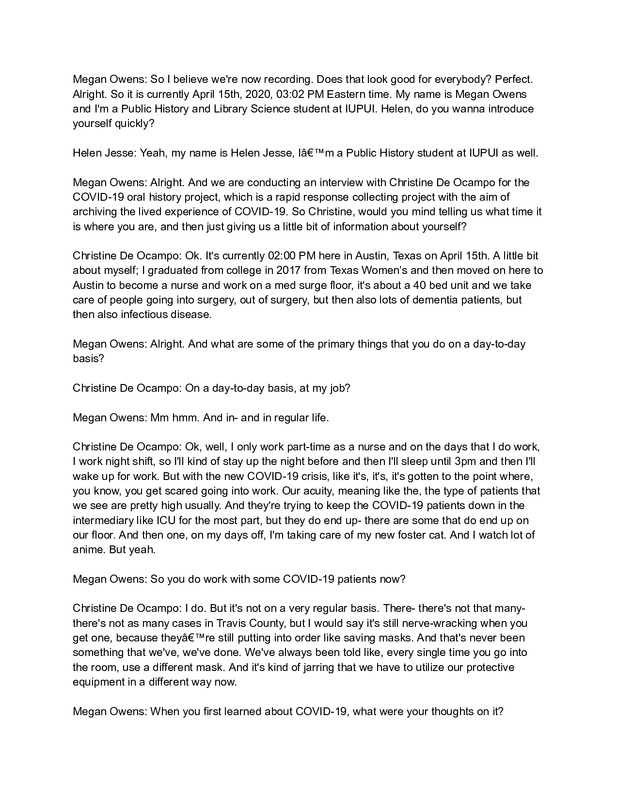 04/15/2020
04/15/2020Christine De Ocampo Oral History, 2020/04/15
-
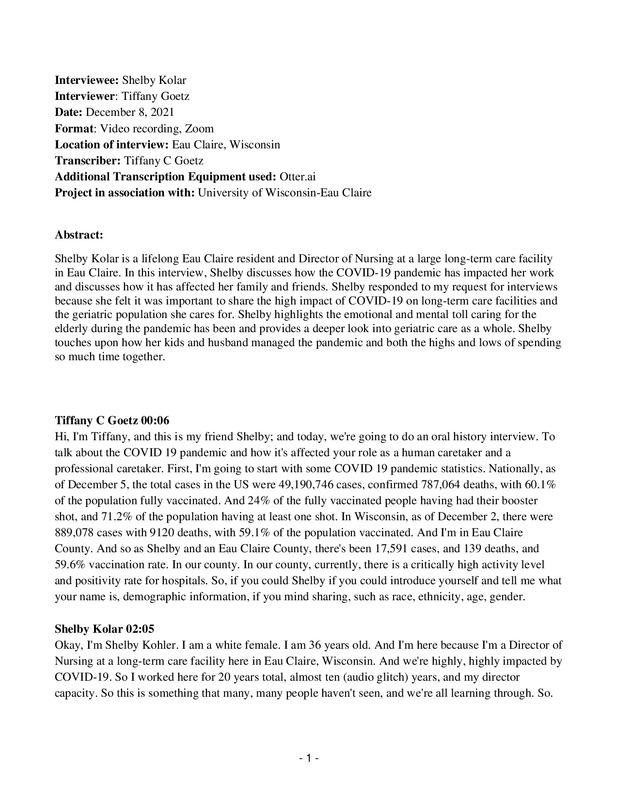 12/08/2021
12/08/2021Shelby Kolar Oral History, 2021/12/08
Shelby Kolar is a lifelong Eau Claire resident and Director of Nursing at a large long-term care facility in Eau Claire. In this interview, Shelby discusses how the COVID-19 pandemic has impacted her work and discusses how it has affected her family and friends. Shelby responded to my interview request because she felt it was important to share the high impact of COVID-19 on long-term care facilities and the geriatric population she cares for. Shelby highlights the emotional and mental toll of caring for the elderly during the pandemic and provides a deeper look into senior care as a whole. Shelby touches upon how her kids and husband managed the pandemic and the highs and lows of spending so much time together. -
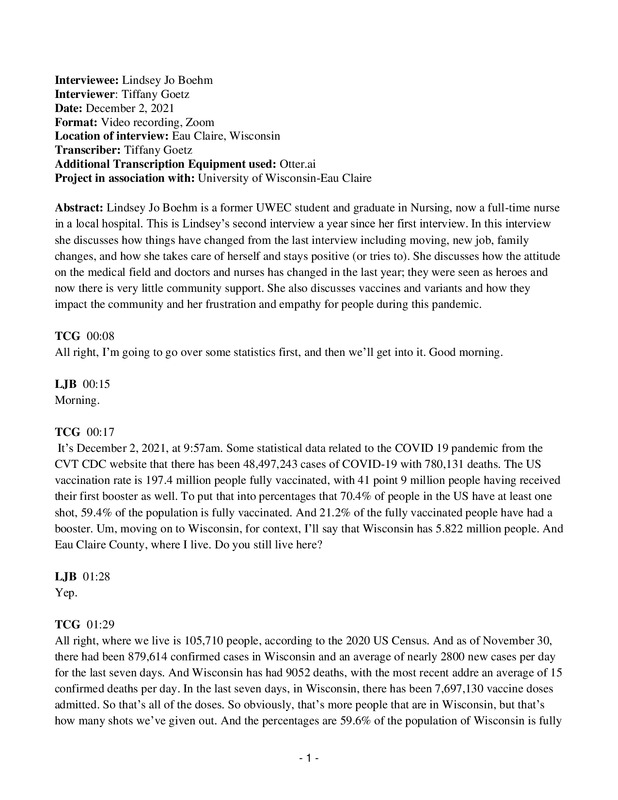 12/02/2021
12/02/2021Lindsey Jo Boehm Oral History, 2021/12/02
Lindsey Jo Boehm is a former UWEC student and graduate in Nursing, now a full-time nurse in a local hospital. This is Lindsey’s second interview a year since her first interview. In this interview, she discusses how things have changed from the last interview including moving, a new job, family changes, and how she takes care of herself and stays positive (or tries to). She discusses how the attitude in the medical field and doctors and nurses has changed in the last year; they were seen as heroes and now there is very little community support. She also discusses vaccines and variants and how they impact the community and her frustration and empathy for people during this pandemic. -
2020-03-06
The Two Week Break
My Junior year at Midwood High School took an expected turn as a national emergency was declared on March 13, 2020. I remember watching the news with my mother, excited to see I would have two weeks off from school. My mother and I would both be home as all non-essential businesses moved to remote or closed down indefinitely. I immediately messaged my friends about the two week break, planning to play video games all day long. We spent those two weeks staying up late as if it was an extended spring break. Little did I know that those two weeks would turn into months of isolation, living in fear of going into the outside world. I feared for my father as he was a registered nurse at Woodhull Hospital. Not only did he have to go outside everyday for work, but he would be face to face with patients, many sick and dying from this new virus that took the world by surprise. There was no vaccine for almost an entire year, so all he could rely on were masks, gloves, face shields and hair nets. My father and many other medical workers were needed overtime to deal with the immense amount of patients coming in everyday. As he came home from work my mother would bring his clothes and leave them by our front door. I worried for him at work as I feared he could get this virus that we were still learning about. Thankfully he never got sick with Covid-19 during the early pandemic, and with the new vaccines in development many of our fears were put to rest. After almost two months of not having any classes we were introduced to remote learning through zoom and google classroom. It was a very new experience for my fellow classmates and I, but it was nice not having to leave your bed to go to class for a while. However that relief of not waking up early to go to class turned into yearning to go to school and seeing my friends. Waking up every morning to see a screen filled with blank profile pictures with names made me feel very lonesome. I would never imagine missing going to school, but it was something that I had taken for granted. In my senior year of high school there was the option for hybrid learning which I was very excited about, but I'd later find out that there would only be rows of desks set up in my school gyms we used for physical education. It wouldn't be the everyday schedule of switching classes and seeing my friends in the hallways and library. I ended up doing another year of remote learning which was very draining but I managed to do well in all my classes with nothing else to do. Unfortunately I did not have a prom or senior trip, but I was very lucky to have an in person graduation and see all of the people I once saw everyday again. This story of the pandemic is very significant to me as it taught me to never take things for granted as everything can change in a moments notice. The things I'd known as my everyday routine of school and hanging out became a distant memory for a long time until numbers and fears of the virus fell. Being able to go to campus now and have a regular life again is something I will now cherish forever. It is still somewhat hard to socialize again after being isolated for so long, but I have made some friends along the way and I look forward to all the memories that await me in the future. -
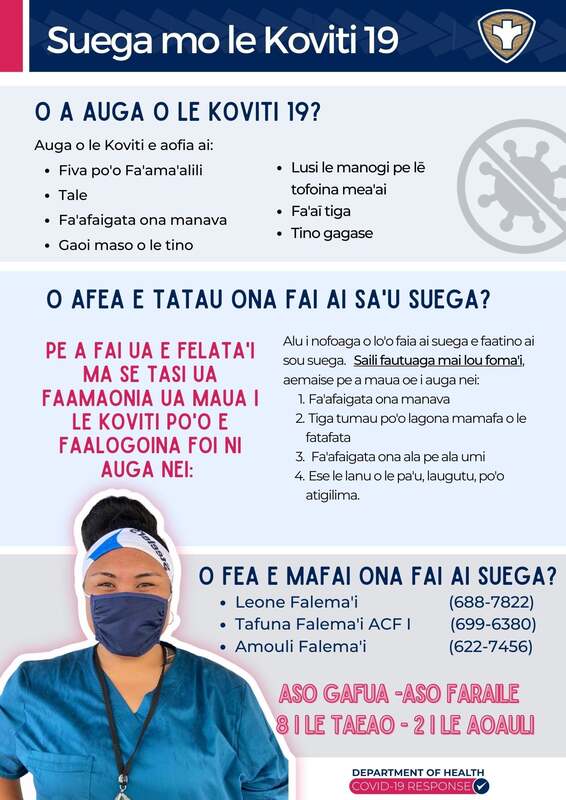 2022-02
2022-02American Samoa COVID-19 Testing Schedule
The American Samoa Department of Health released this flyer in both English and Samoan languages for the public so they would know what time and day COVID testing sites are open, where they are located, and the number to call for each site if they need further information. Not only was this released online but placed in every store of the island. -
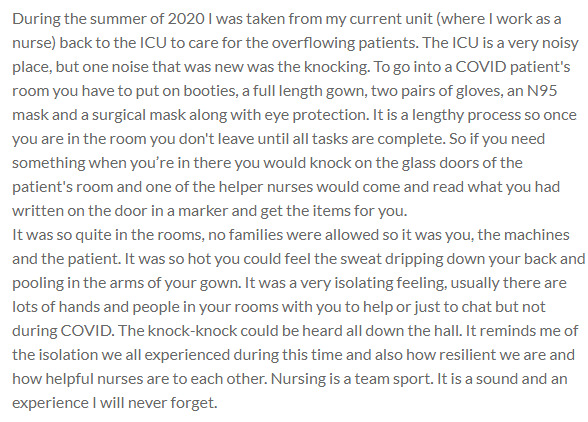 2020-08-06
2020-08-06Knock Knock
During the summer of 2020 I was taken from my current unit (where I work as a nurse) back to the ICU to care for the overflowing patients. The ICU is a very noisy place, but one noise that was new was the knocking. To go into a COVID patient's room you have to put on booties, a full length gown, two pairs of gloves, an N95 mask and a surgical mask along with eye protection. It is a lengthy process so once you are in the room you don't leave until all tasks are complete. So if you need something when you’re in there you would knock on the glass doors of the patient's room and one of the helper nurses would come and read what you had written on the door in a marker and get the items for you. It was so quite in the rooms, no families were allowed so it was you, the machines and the patient. It was so hot you could feel the sweat dripping down your back and pooling in the arms of your gown. It was a very isolating feeling, usually there are lots of hands and people in your rooms with you to help or just to chat but not during COVID. The knock-knock could be heard all down the hall. It reminds me of the isolation we all experienced during this time and also how resilient we are and how helpful nurses are to each other. Nursing is a team sport. It is a sound and an experience I will never forget. -
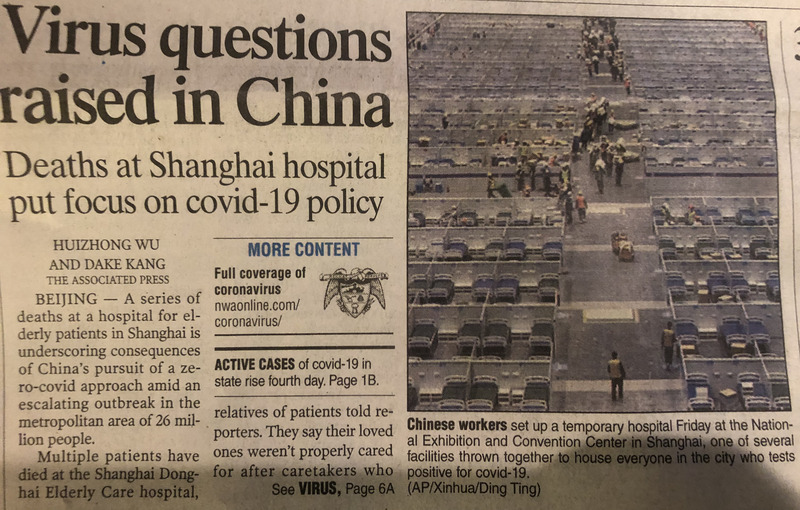 2022-04-10
2022-04-10Virus Questions Raised in China
This is a newspaper article detailing the repercussions of China's "Zero-COVID" policy and the impact it has on families. The story reports a rise in deaths at a Shanghai hospital for the elderly and a further rise in COVID cases in Shanghai. Extensive regulations at the hospital have forced a decrease in hospital staff to manage the many elderly patients suffering with COVID. The article details that a significant number of patients are asymptomatic, yet are placed in strict quarantine to minimize the spread. There are reports of several patients dying due to a lack of proper care from medical professionals who are forced to be absent from the patient as they are locked in strict quarantine. The article further suggests that perhaps China's "Zero-COVID" policy approach is creating far more significant damage to individuals and their families than good. I think this article is interesting because it details an alternative approach to U.S. policy which has maintained a very relaxed and hands-off attitude for a majority of the pandemic. While many states took arguably excessively extreme measures, many states were lax on quarantine, mask enforcement, lockdown protocols, etc. Furthermore, China's policy seems a bit excessive, so perhaps the right answer lies somewhere in the middle. This Article was published April 10th, 2022 in the Northwest Arkansas Democrat Gazette. -
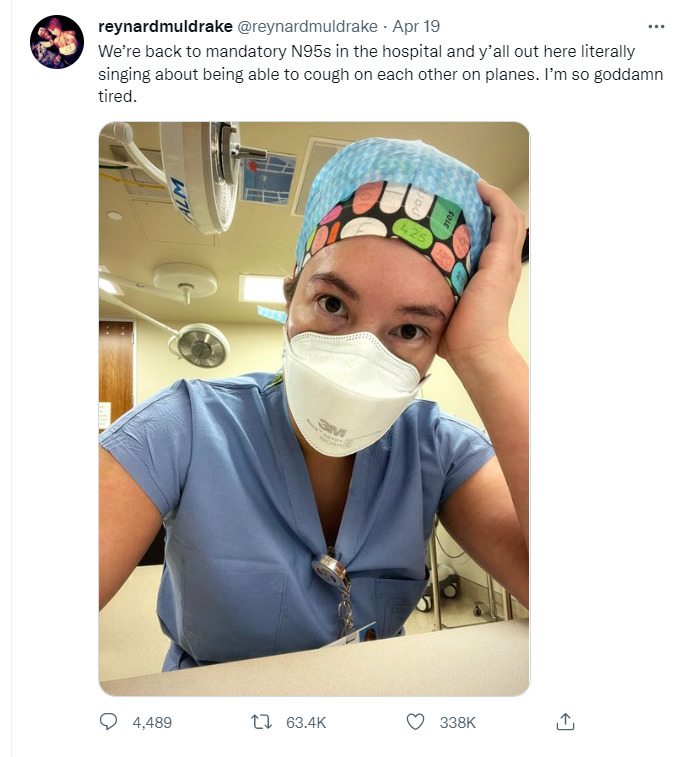 2022-04-19
2022-04-19Twitter post in response to masks no longer being federally required on planes
A Twitter user, who works in a hospital, shares her frustrations after masks are no longer federally required on planes. Many people are happy about this ruling, but others, especially those on the "frontlines" in the hospitals, are expressing their frustrations with people acting as if the pandemic is over. -
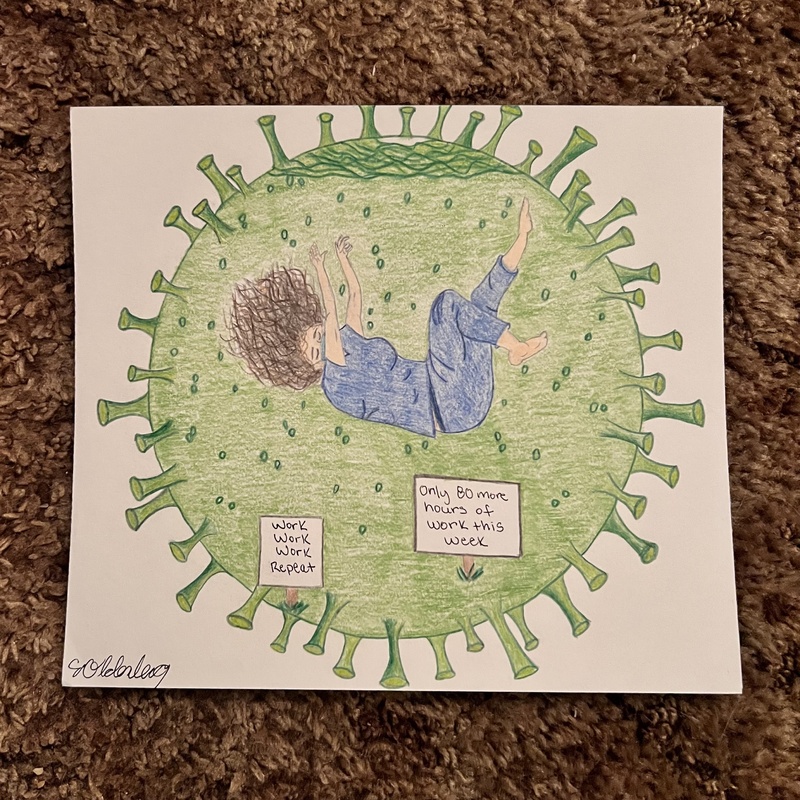 2022-02-23
2022-02-23Sinking into a Deep Sleep
I illustrated a CNA drowning in a molecule of sars-coV-19, also known as COVID19, to show the extreme conditions healthcare workers have been trying to push through during this pandemic. We have been working countless hours of overtime, sometimes for 24 or 48 hours straight due to understaffing, healthcare workers quitting, and others getting fired from refusing the vaccine. Our jobs have become very overwhelming, with the amount of cares we must provide for our patients, and with the thought of this pandemic having no end in sight, it's as if we're drowning in this pandemic. Healthcare workers are drowning in all the cares they must provide their patients, that they're unable to take care of themselves, and soon we won't have many healthcare and medical professionals left. That is why I chose to portray this CNA the way I did, and I hope others can agree with my experiences. -
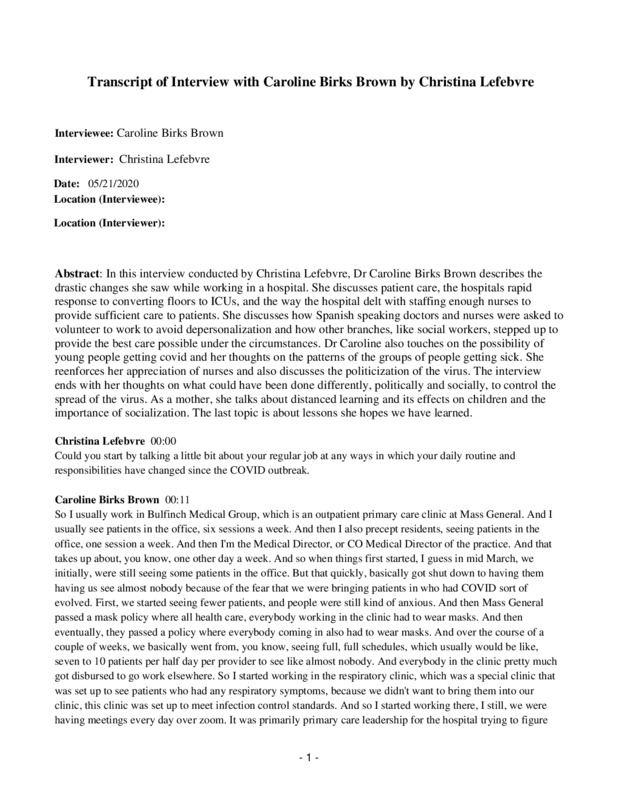 08/21/2020
08/21/2020Caroline Birks Brown Oral History, 2020/05/31
In this interview conducted by Christina Lefebvre, Dr Caroline Birks Brown describes the drastic changes she saw while working in a hospital. She discusses patient care, the hospitals rapid response to converting floors to ICUs, and the way the hospital delt with staffing enough nurses to provide sufficient care to patients. She discusses how Spanish speaking doctors and nurses were asked to volunteer to work to avoid depersonalization and how other branches, like social workers, stepped up to provide the best care possible under the circumstances. Dr Caroline also touches on the possibility of young people getting covid and her thoughts on the patterns of the groups of people getting sick. She reenforces her appreciation of nurses and also discusses the politicization of the virus. The interview ends with her thoughts on what could have been done differently, politically and socially, to control the spread of the virus. As a mother, she talks about distanced learning and its effects on children and the importance of socialization. The last topic is about lessons she hopes we have learned. -
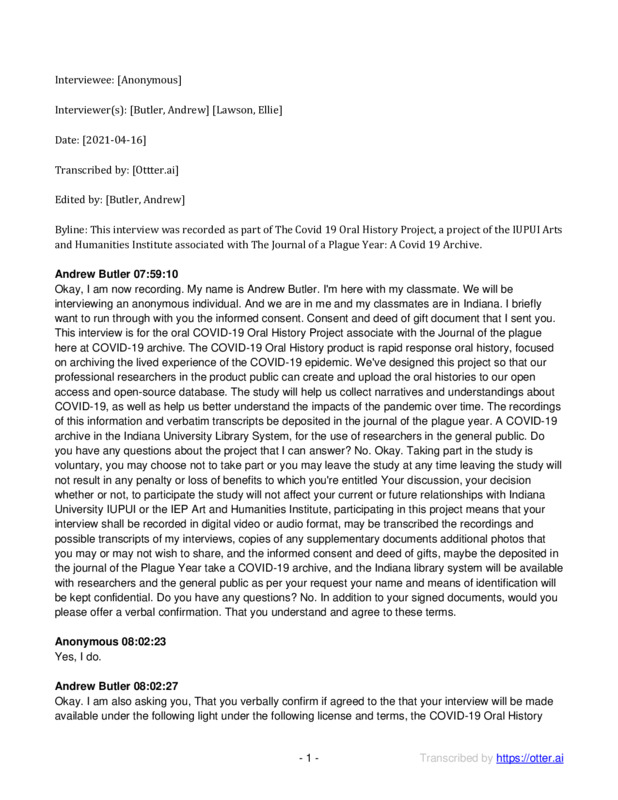 04/30/2021
04/30/2021Anonymous Oral History, 2021/04/16
C19OH -
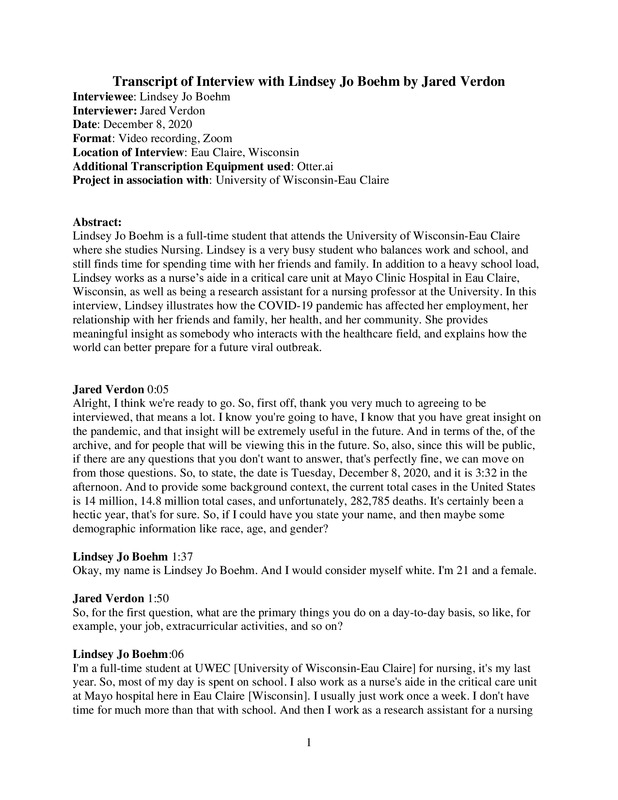 12/08/2020
12/08/2020Lindsey Jo Boehm Oral History, 2020/12/08
Lindsey Jo Boehm is a full-time student that attends the University of Wisconsin-Eau Claire where she studies Nursing. Lindsey is a very busy student who balances work and school, and still finds time for spending time with her friends and family. In addition to a heavy school load, Lindsey works as a nurse’s aide in a critical care unit at Mayo Clinic Hospital in Eau Claire, Wisconsin, as well as being a research assistant for a nursing professor at the University. In this interview, Lindsey illustrates how the COVID-19 pandemic has affected her employment, her relationship with her friends and family, her health, and her community. She provides meaningful insight as somebody who interacts with the healthcare field, and explains how the world can better prepare for a future viral outbreak. -
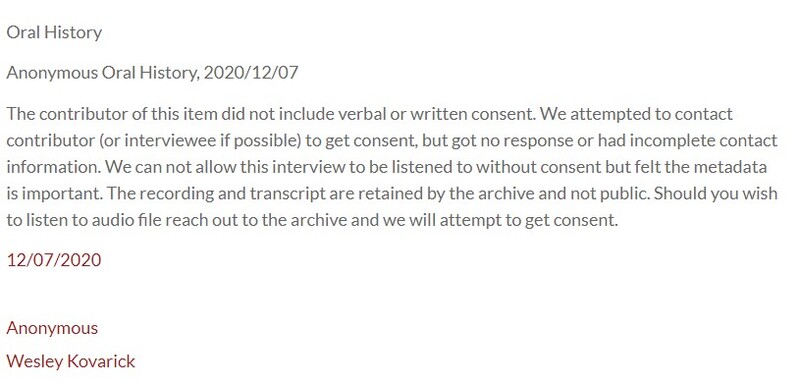 12/07/2020
12/07/2020Anonymous Oral History, 2020/12/07
The contributor of this item did not include verbal or written consent. We attempted to contact contributor (or interviewee if possible) to get consent, but got no response or had incomplete contact information. We can not allow this interview to be listened to without consent but felt the metadata is important. The recording and transcript are retained by the archive and not public. Should you wish to listen to audio file reach out to the archive and we will attempt to get consent. -
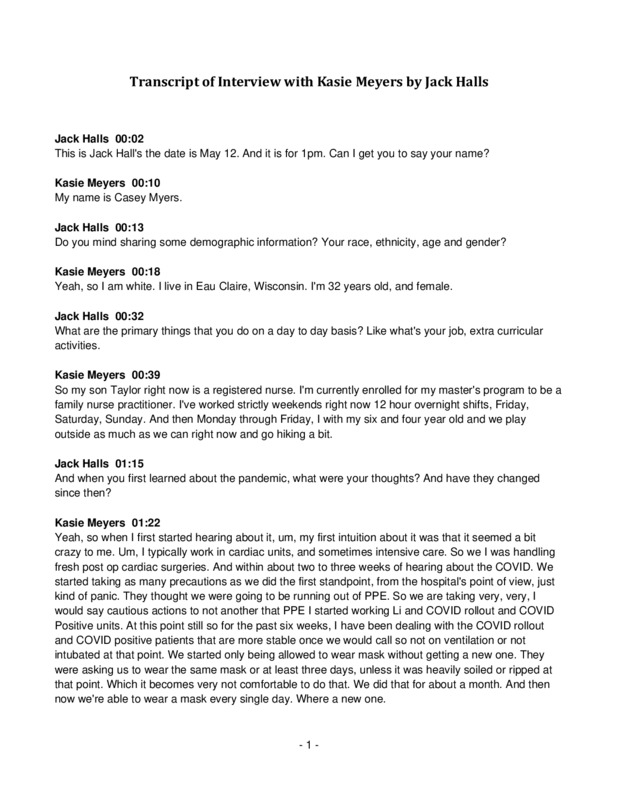 05/12/2020
05/12/2020Kasie Meyers Oral History, 2020/05/12
Interview with Kasie Meyers by Jack Halls. In this interview, Kasie Meyers discusses how COVID has impacted her role as a nurse and the changes she and her colleagues face. She also discusses her journey as a student and how covid has impacted her studies, she touches on her role as a mother and the difficulties that have been heightened because of the pandemic. She expresses how her relationships with friends and family have changed and also discusses her view on the government and its handling of the pandemic. -
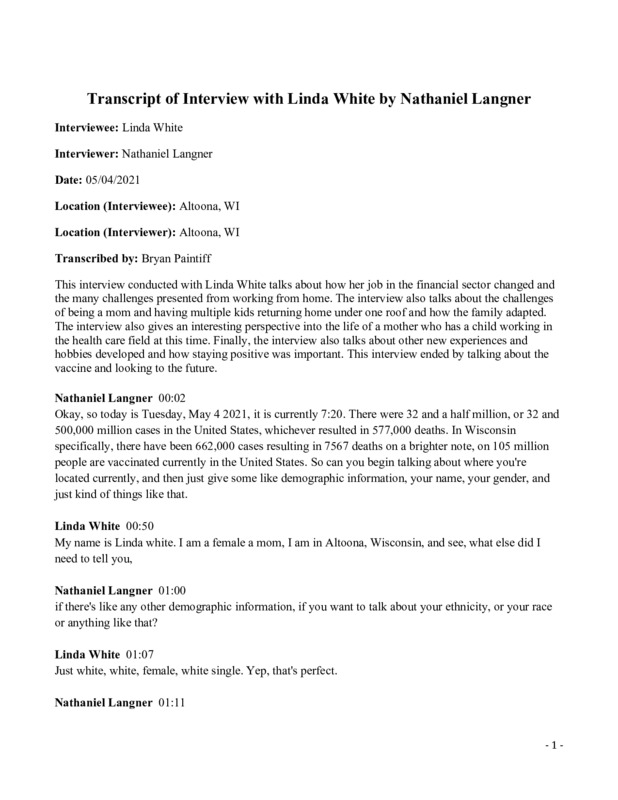 05/06/2021
05/06/2021Linda White Oral History, 2021/05/04
This interview conducted with Linda White talks about how her job in the financial sector changed and the many challenges presented from working from home. The interview also talks about the challenges of being a mom and having multiple kids returning home under one roof and how the family adapted. The interview also gives an interesting perspective into the life of a mother who has a child working in the health care field at this time. Finally, the interview also talks about other new experiences and hobbies developed and how staying positive was important. This interview ended by talking about the vaccine and looking to the future. -
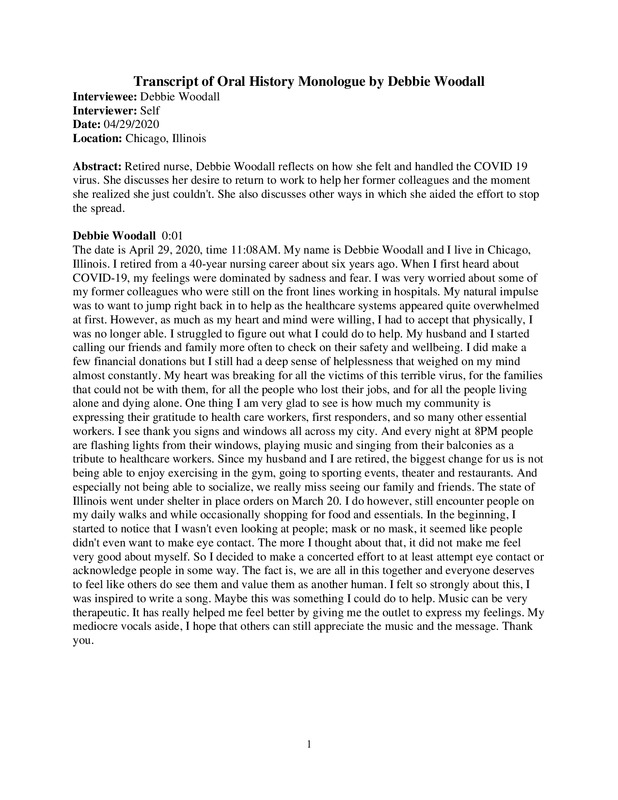 2020-05-20
2020-05-20Debbie Woodall Oral History, 2020/04/29
Retired nurse, Debbie Woodall reflects on how she felt and handled the COVID 19 virus. She discusses her desire to return to work to help her former colleagues and the moment she realized she just couldn't. She also discusses other ways in which she aided the effort to stop the spread. -
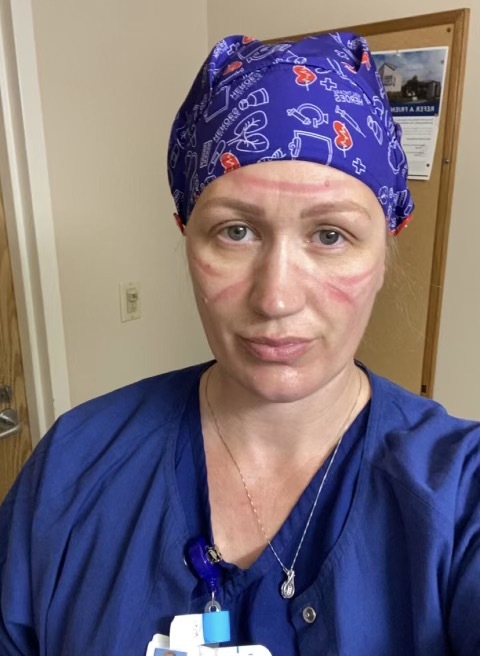 2020
2020Effects of PPE
This photo is an important reflection of what healthcare providers have had to endure and the lasting physical and mental toll the pandemic has taken. It was taken after a 12 hour shift of wearing PPE non-stop. -
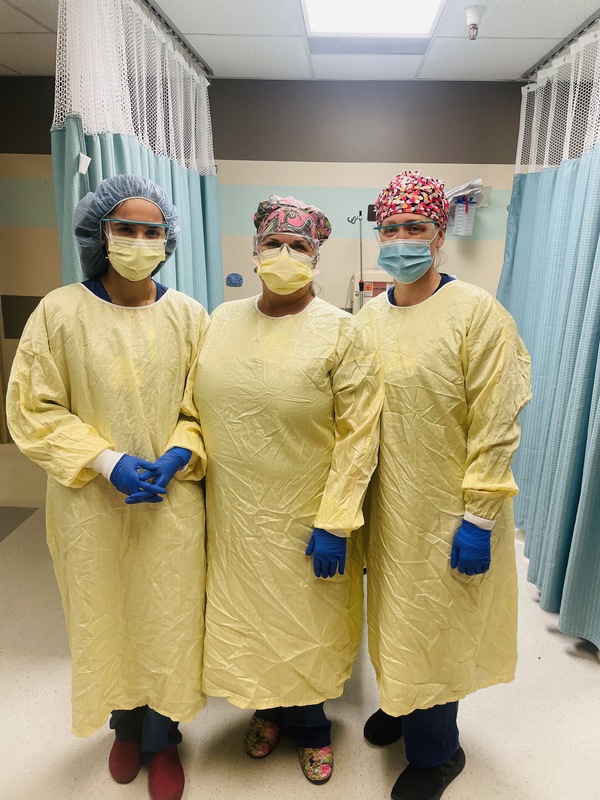 2021
2021Another Hospital
My mother worked at several hospitals throughout the beginning of the pandemic, as there were nurse shortages. At this particular location, she working in several units including the ICU, outpatient surgery, and distributing vaccines. This is important to me because seeing my mom dressed like this and hearing about how she worked in multiple places any given day put into perspective how dire the situation was and continues to be. -
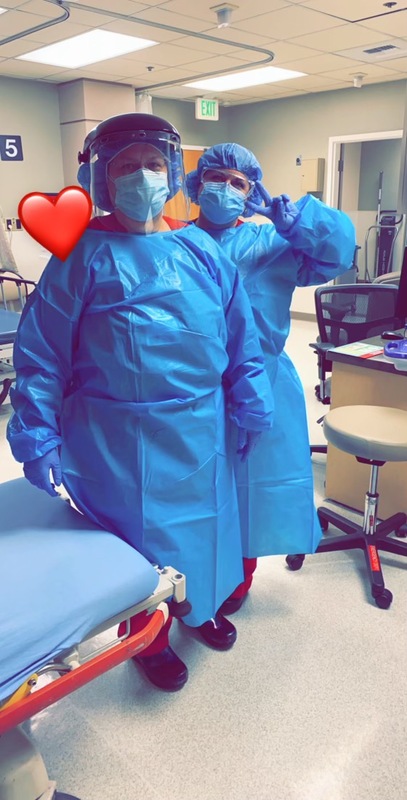 2020
2020My Mom Working in the COVID ICU
While this is not me, it is still important to me since it is my mom. She has worked in the COVID ICU almost the entire time, and I was really affected by seeing her gowned up like that the first time. Her career during my lifetime has not required so much PPE, so it was a really surreal moment that forced me to really appreciate the extremity of the pandemic and how much danger my mom was in. -
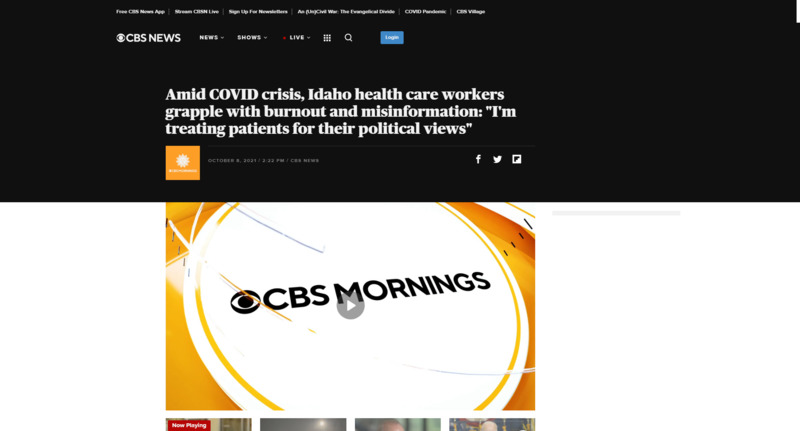 2021-10-08
2021-10-08Idaho and the Overrun Hospitals
Idaho hospitals are so overrun with Covid patients and so understaffed that they are drowning. Idaho has one of the lowest vaccination rates in the nation and many people are getting sick. Many hospitals on the border Idaho shares with Washington are choosing to send their sick patients to Washington. This in turn is adding to the burden carried in Eastern Washington. Many healthcare workers in Idaho are burnt out and they are helpless because of the divisiveness caused by politics and Covid. -
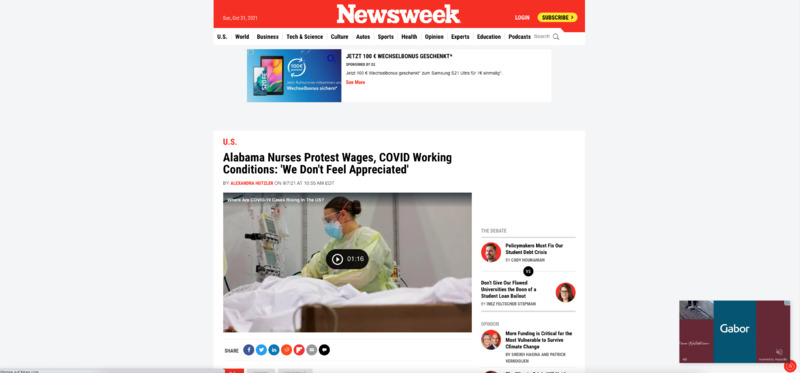 2021-09-07
2021-09-07Alabama Nurses Protest Wages, COVID Working Conditions: 'We Don't Feel Appreciated'
Nurses in Birmingham, Alabama protested unequal compensation and poor working conditions at UAB Hospital by refusing to clock-in for the night shift. -
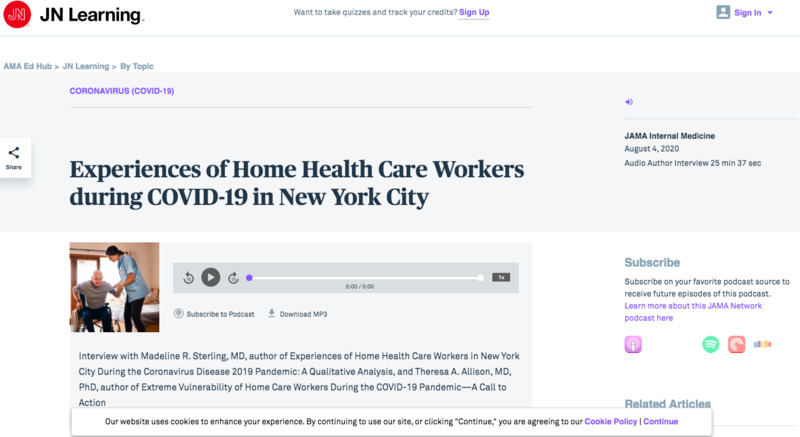 2020-08-04
2020-08-04Experiences of Home Health Care Workers during COVID-19 in New York City
Interview with Madeline R. Sterling, MD, author of Experiences of Home Health Care Workers in New York City During the Coronavirus Disease 2019 Pandemic: A Qualitative Analysis, and Theresa A. Allison, MD, PhD, author of Extreme Vulnerability of Home Care Workers During the COVID-19 Pandemic—A Call to Action -
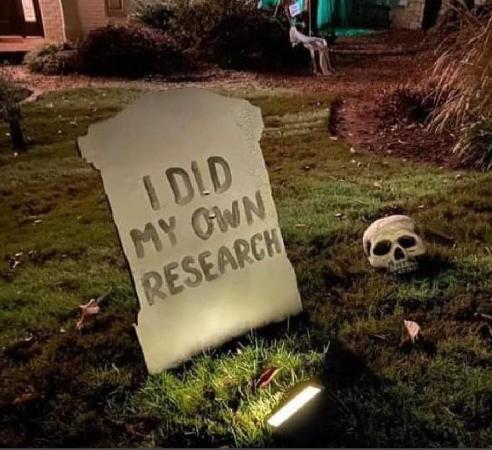 2021-10-01
2021-10-01Ironic meme
A friend of mine who is a nurse and cared for people with Covid throughout the pandemic sent this to me after the vaccination was available for 7 months and she was still caring for patients who didn’t believe in the vaccine or who weren’t yet convinced to get it. It speaks to the burnout and frustration on from line workers. -
2020-03
Recollections from an Oncology Nurse
My mom is an oncology nurse and has worked in the field of nursing for the past 30 years. I recently asked her to talk to me about her experience this past year as a healthcare worker. She recalled the first week in March when things were becoming intense. People were asked to wear face shields and gowns as they were working in an immune-compromised area where the patients had cancer. At the time there was no vaccine. “It was incredibly intense and scary” my mother said. “People were worried about getting Covid from other staff at the hospital and also worried about contracting Covid from the patients.” “I walked into the hospital and there was an incredible underlying anxiety, the feeling of unease was palpable. People did not talk to each other like they normally did - everyone was consumed with the thought of not using each other’s pens, putting gloves on when receiving things from the pharmacy. Things we would never have even thought of before.” She continued, “It was a feeling of both being unsettled and a blind trust you put in your coworkers to be as clean, as responsible and in isolation outside of work as you. The intensity of that feeling was there the moment you walked in. The environment had changed. People were not as happy, communicative, relaxed.” She explained how working in Covid - there was an incredible newness to it - a fear and apprehension. -
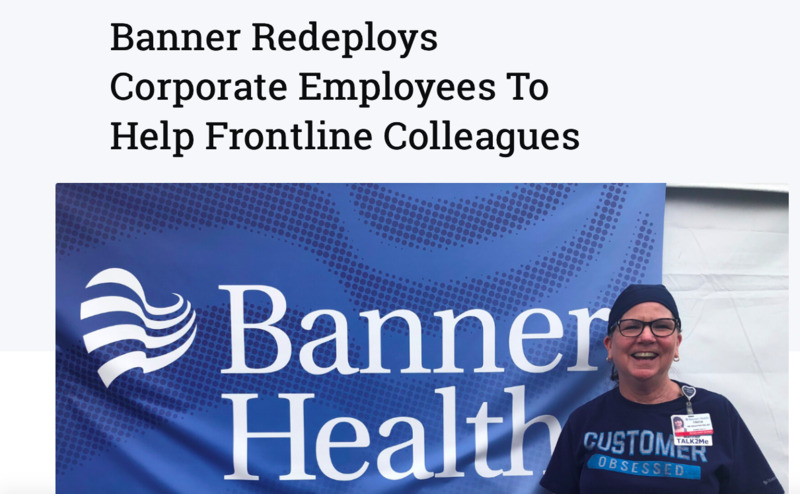 2020-04-02
2020-04-02Banner Redeploys Corporate Employees To Help Frontline Colleagues
A blog post from Banner Health about corporate workers going back to a nursing role. -
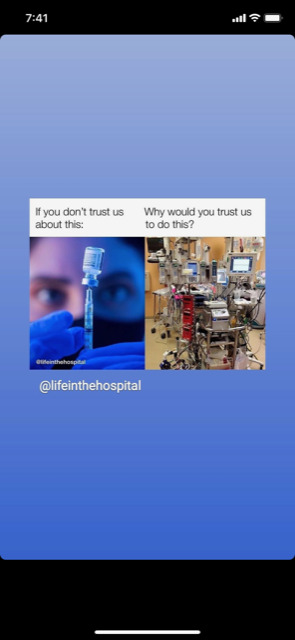 2021-08-16
2021-08-16Truth
a nurse friend of mine posted this on her Instagram story. It's hard to understand the logic of the anti-mask, anti-vax community. -
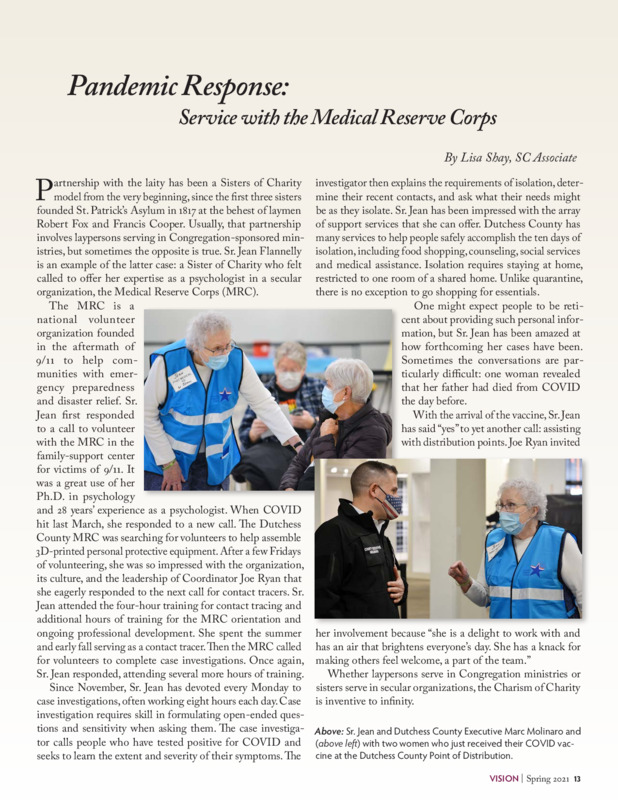 2021-03-02
2021-03-02A Religious Sister’s Service with the Medical Reserve Corps
This article celebrates the dedication of a friend and mentor, Sister Jean Flannelly, SC, who, at age 80, volunteered to serve with the Dutchess County New York Medical Reserve Corps to help people affected by the pandemic. Despite age and some health problems, she felt called to use her many talents as a psychologist, teacher, counselor and religious sister to do contact tracing, case investigation and serve in various roles at COVID-19 vaccination sites. She is an inspiration to me and to many! -
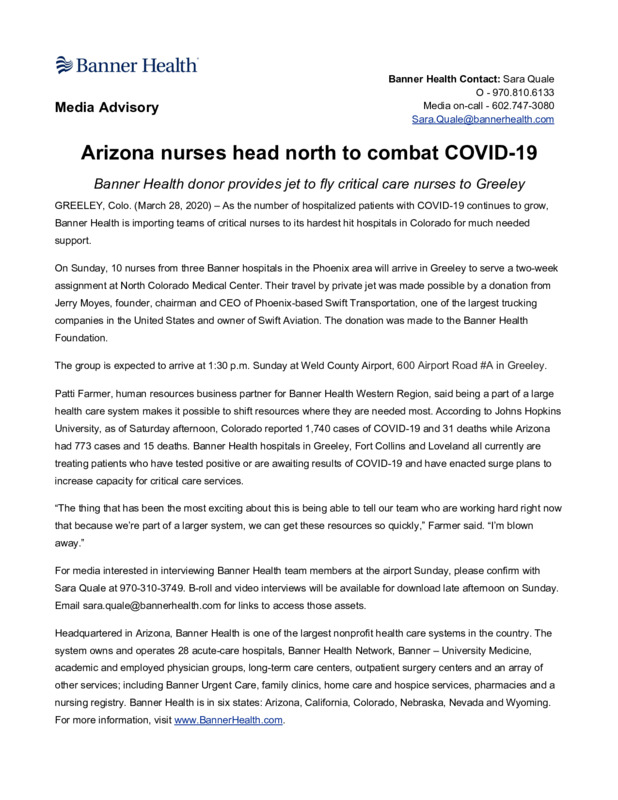 2020-03-29
2020-03-29Arizona nurses head north to combat COVID-19
A press release from Banner Health announcing that ten nurses from three Banner hospitals in the Phoenix area arrived Sunday in Greeley to serve a two-week assignment at North Colorado Medical Center. -
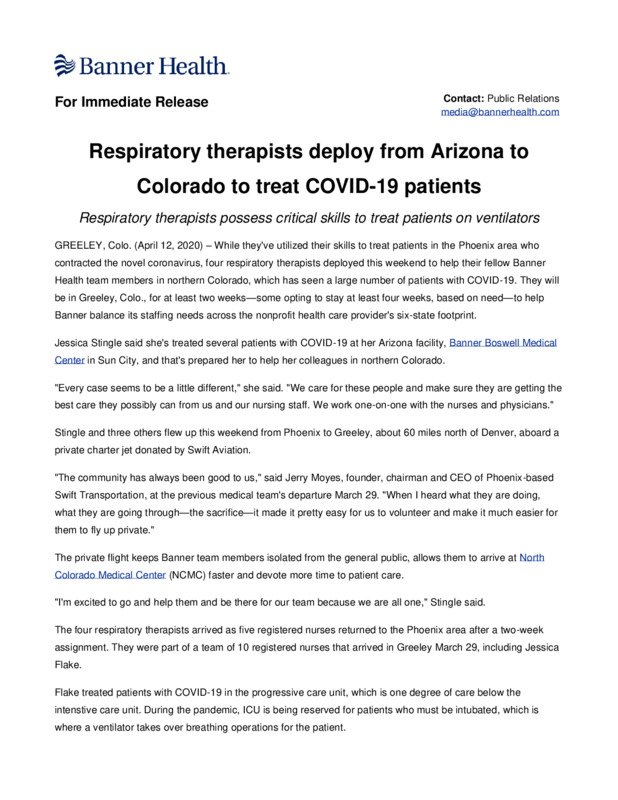 2020-04-12
2020-04-12Respiratory therapists deploy from Arizona to Colorado to treat COVID-19 patients
A press release from Banner Health announcing that four respiratory therapists deployed this weekend to help their fellow Banner Health team members in northern Colorado, which has seen a large number of patients with COVID-19. They will be in Greeley, Colo., for at least two weeks—some opting to stay at least four weeks, based on need—to help Banner balance its staffing needs across the nonprofit health care provider's six-state footprint. -
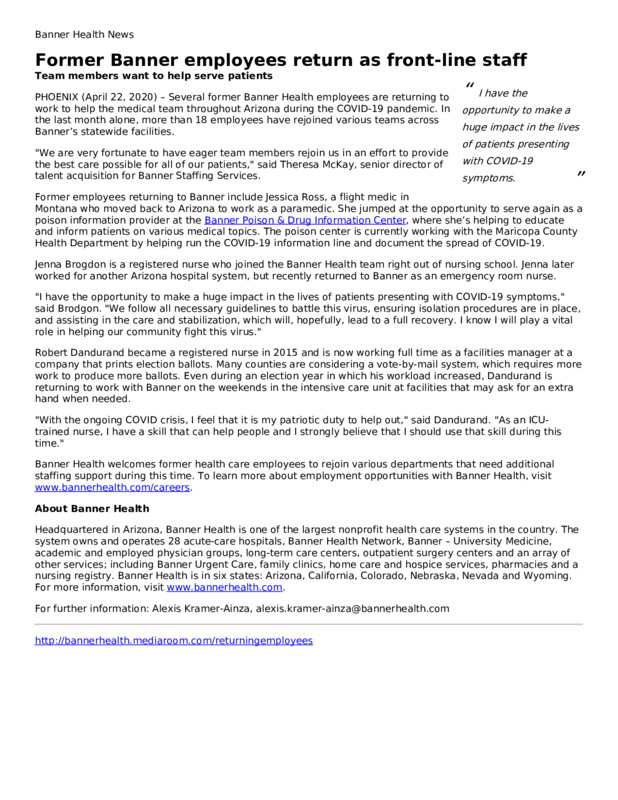 2020-04-21
2020-04-21Former Banner employees return as front-line staff
A press release describing how several former Banner Health employees are returning to work to help the medical team throughout Arizona during the COVID-19 pandemic. In the last month alone, more than 18 employees have rejoined various teams across Banner’s statewide facilities. -
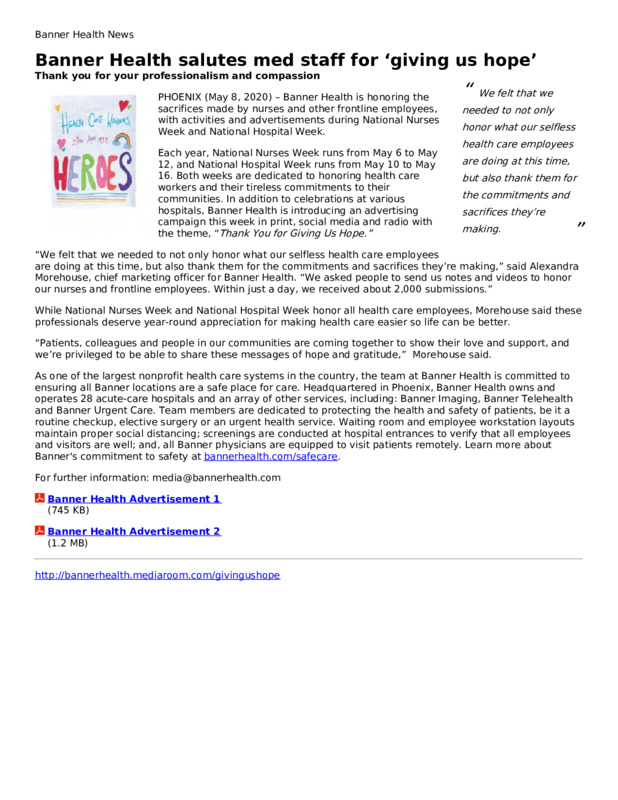 2020-05-08
2020-05-08Banner Health salutes med staff for ‘giving us hope’
A press release from Banner Health announcing how they are honoring the sacrifices made by nurses and other frontline employees, with activities and advertisements during National Nurses Week and National Hospital Week. -
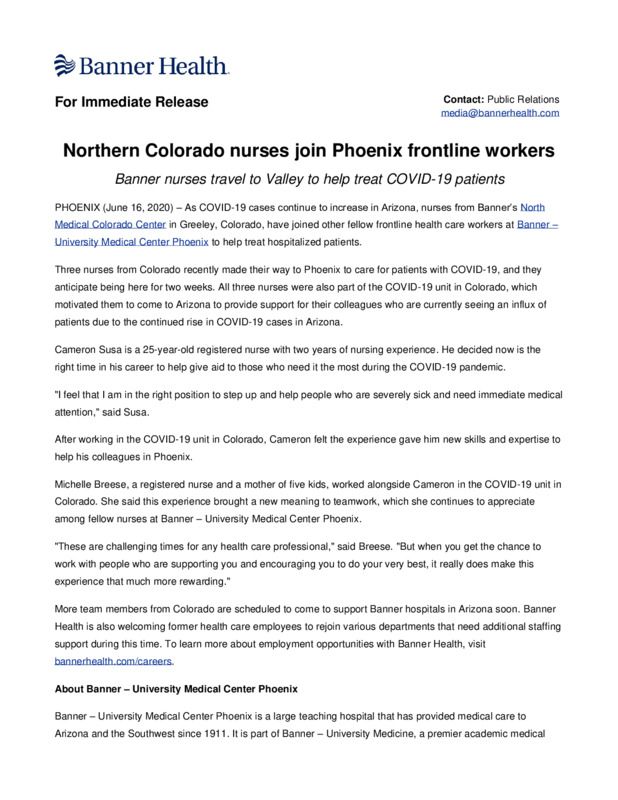 2020-06-16
2020-06-16Northern Colorado nurses join Phoenix frontline workers
As COVID-19 cases continue to increase in Arizona, nurses from Banner’s North Medical Colorado Center in Greeley, Colorado, have joined other fellow frontline health care workers at Banner – University Medical Center Phoenix to help treat hospitalized patients. -
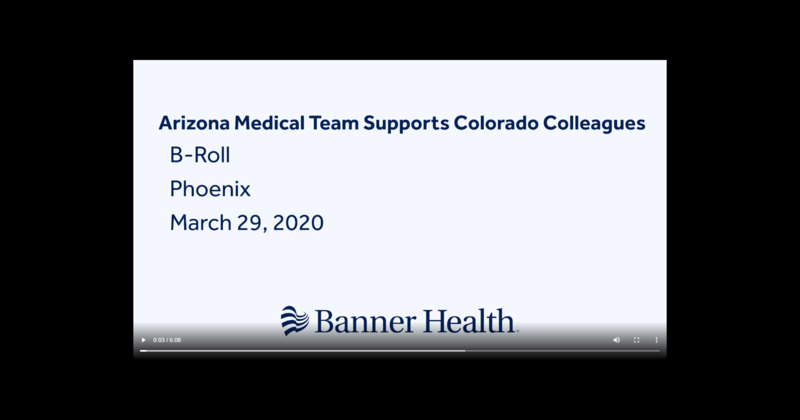 03/29/2020
03/29/2020Arizona nurses support Colorado colleagues
Ten nurses from Banner Health’s Arizona hospitals are heading to northern Colorado to assist their colleagues at the Banner-owned hospital in Greeley, North Colorado Medical Center. -
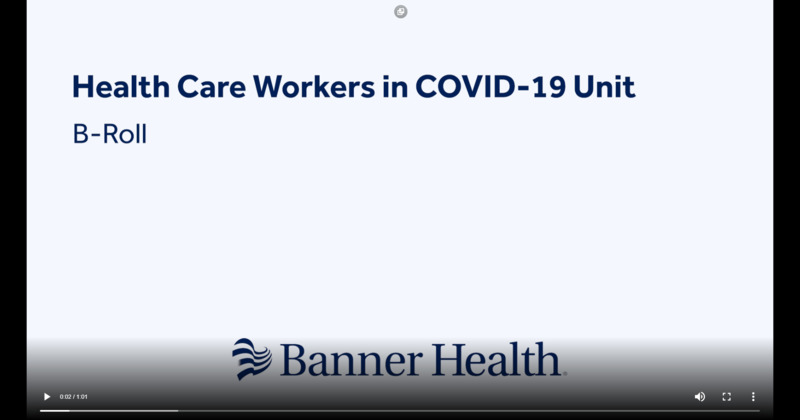 07/22/2021
07/22/2021COVID-19 health care workers in unit
Nurses, respiratory therapists, physicians and others throughout Banner Health work around the clock to care for patients with COVID-19. B-Roll available for download, editing and broadcast. -
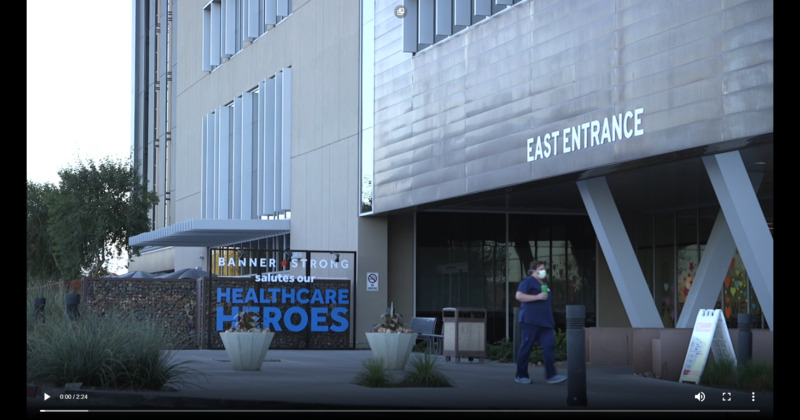 07/22/2021
07/22/2021COVID-19 Hospital care B-roll
B-roll of Banner Estrella Medical Center in west Phoenix where more than a thousand COVID-19 patients have been successfully treated during the pandemic. -
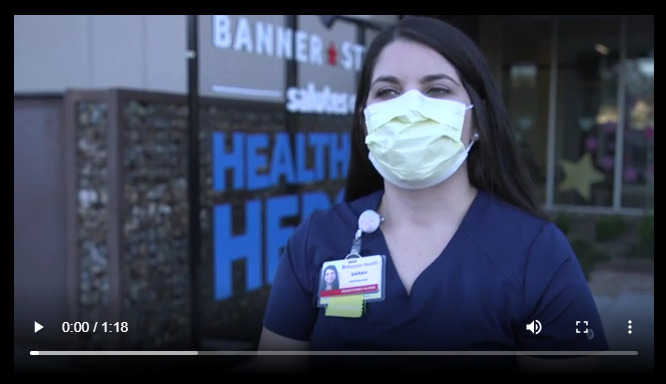 07/22/2021
07/22/2021COVID-19 RN talks about caring for patients
Sarah Asel, RN, talks about what it is like to care for COVID-19 patients and the joy she experiences as one returns to thank her and colleagues for their care. -
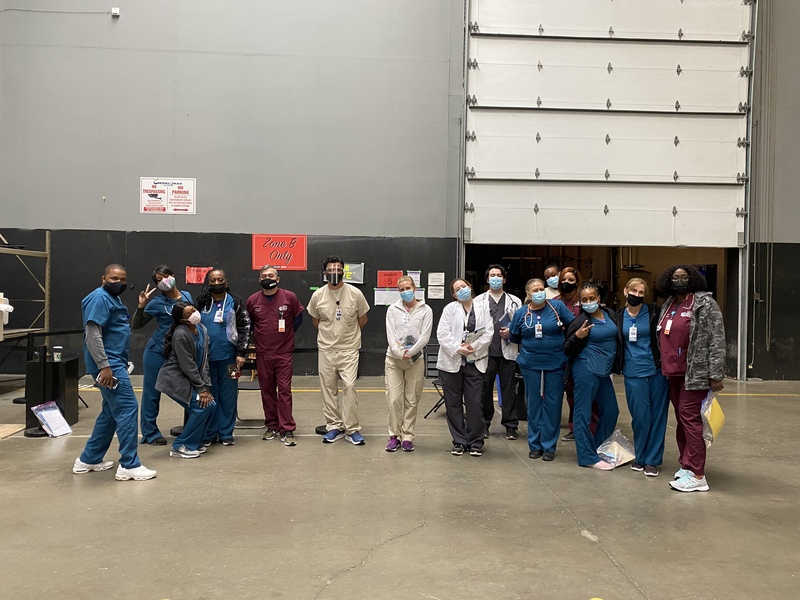 2021-04-28
2021-04-28FILM SETS IN 2020
Working on NBCs Chicago MED full time during a pandemic was not hard, but we were lucky to be able to incorporate Covid 19 into our story lines in order to keep masks on and people safer. Here is a photo of our background nurses posing with their masks on before heading in to set! -
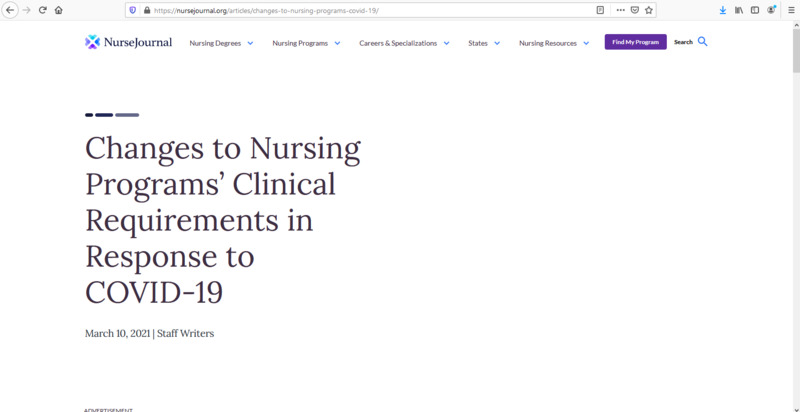 2021-03-10
2021-03-10Nursing schools response to Covid
Covid-19 and the pandemic has had a significant impact on the healthcare industry. Healthcare providers that were nearing retirment had a good reason to retire early, and many others that felt the job became too dangerous or mentally taxing left the medical field forever due to Covid-19. The numbers of nurses have suffered as a result, and that means that during the worst healthcare crisis in recent history, the nurses that were working had even more burden placed on them by staffing problems. This article explains the ways in which nursing schools have responded to try and get more people into the field. -
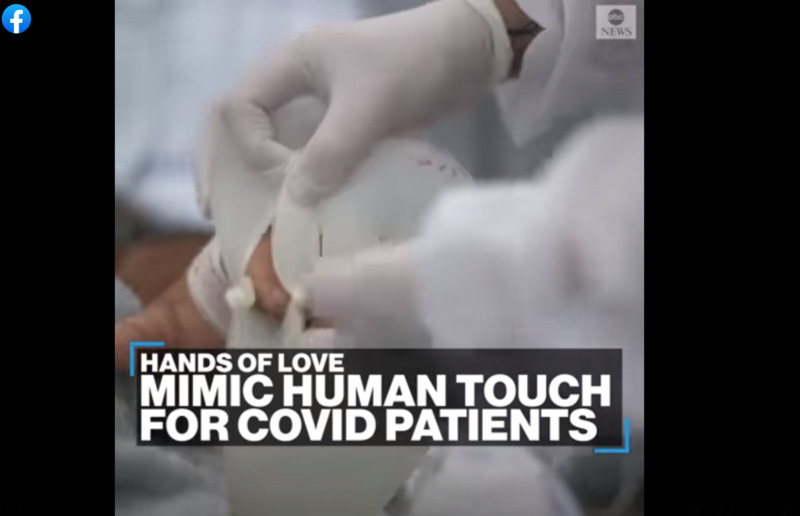 2021-04-21
2021-04-21Hands of love help COVID-19 patients in hospital
HANDS OF LOVE: Nurses fill latex gloves with warm water in a technique called "little hands of love" to help COVID-19 patients in intensive care beat isolation and stimulate blood flow. -
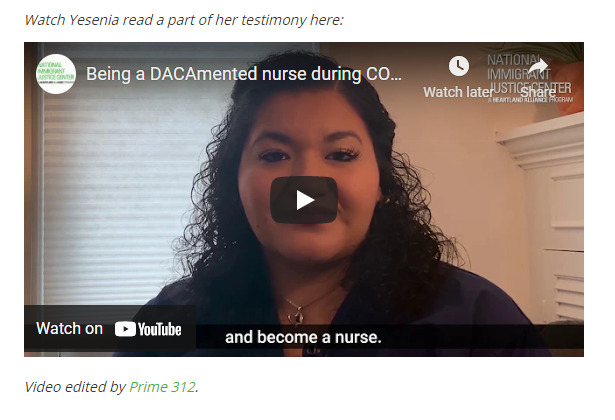 2020-06-19
2020-06-19DACA On The COVID-19 Ward: Yesenia's Story
My name is Yesenia, and I am a DACA recipient and a nurse. As of a few weeks ago, I have been a nurse primarily in the COVID-19 unit at my local hospital in Indiana, where I live. Since COVID-19 began, my world, along with everyone else's, has been flipped upside down. It is hard to express how much my job has changed since COVID-19. I knew when I went into critical care nursing that I would have unexpected situations at work. I never thought there would be a whole floor of uncertainties. It is really overwhelming when you know that you are not enough for what is to come. But you always try your best. -
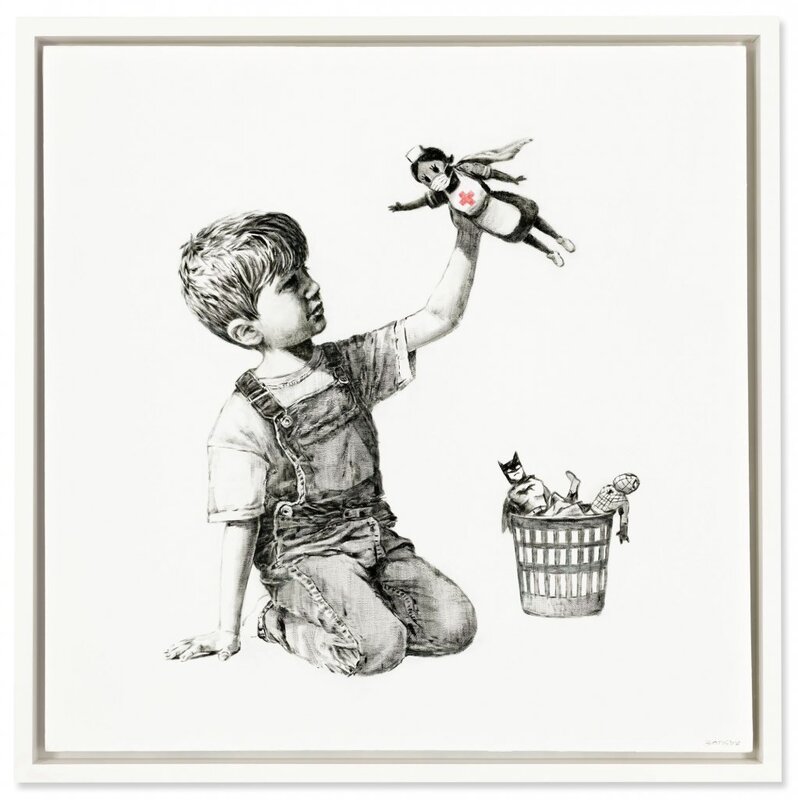 2021-03-21
2021-03-21Banksy’s ‘Game Changer’ Canvas sells for a record £16.7m in aid of NHS charities, 2021
Banksy will donate the hammer price of £14.4m to help support health organisations and charities across the UK that enhance the NHS’s care and treatment. Christie’s Auction House will “donate a significant portion of the Buyer’s Premium to these causes” too. The Game Changer canvas first appeared in May 2020 at the University Hospital Southampton as a thank you to all the staff and NHS workers across the country during the first wave of the Covid-19 pandemic. The black and white artwork shows a little boy playing with a superhero nurse whilst Batman and Spiderman’s usual heroes are now in the trash. A reproduction of Game Changer will remain on view at University Hospital Southampton hospital. -
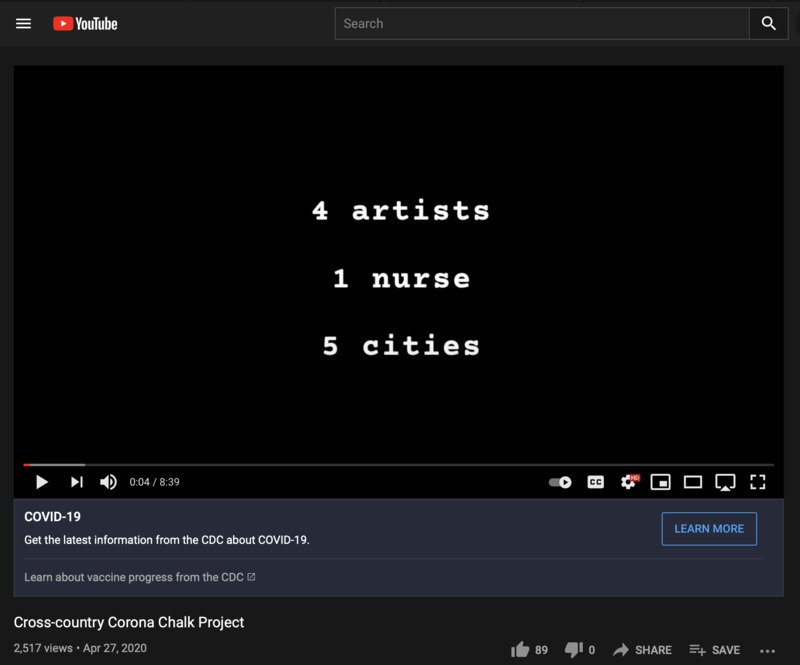 2020-04-27
2020-04-27Pandemic Street Art: Cross-country Corona Chalk Project
A group of chalk artists connected remotely to create a piece of chalk art to honor frontline workers. The artists were Naomi Haverland from Seattle, Washington, Jolene Russell from Sacramento, California, Anat Ronen from Houston, Texas, Jessi Queen from Atlanta, Georgia, Shelly and Dave Brenner from Ann Arbor, Michigan. Dave photographed his wife Shelly, who is also a Certified Registered Nurse Anesthetist, for a collaborative chalk art piece with each artist making their part in their hometown. -
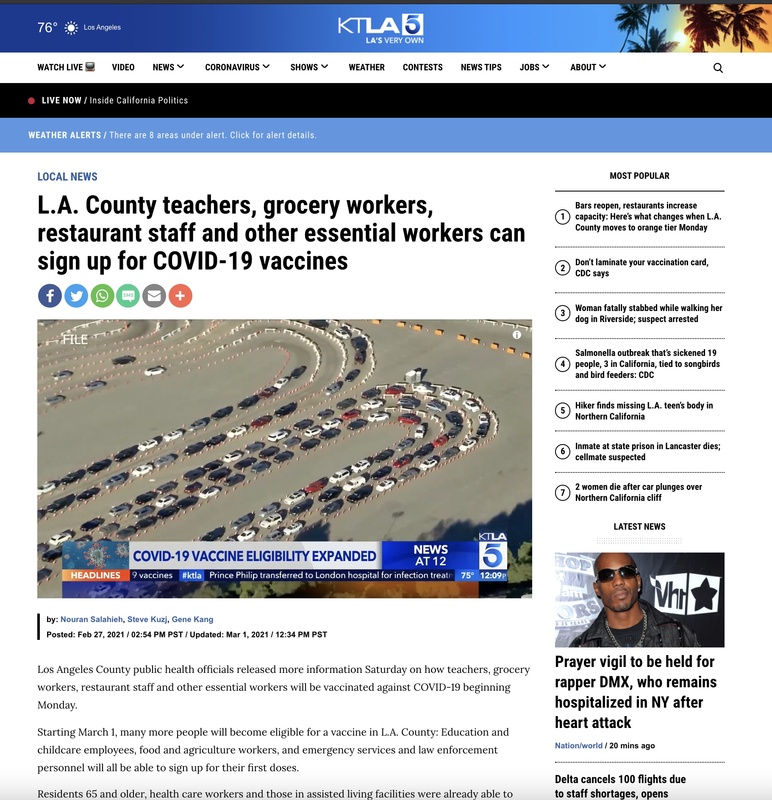 2021-02-27
2021-02-27L.A. County teachers, grocery workers, restaurant staff and other essential workers can sign up for COVID-19 vaccines
Los Angeles Country prioritized teachers, grocery workers, restaurant staff, and other essential workers in their vaccine rollout, making them eligible the beginning of March. Given the high level of exposure these positions involve, this is necessary to protect essential workers and limit the spread of Covid-19. Also prioritized are transportation workers, homeless individuals and those in prisons, as they are often in close contact with groups of people. Not all states are following this prioritization of essential workers despite the CDC recommendations, focusing instead on factors such as age to guide their rollout. By protecting teachers, service industry workers, and others in contact with large numbers of people every day, we can slow the spread of Covid-19. -
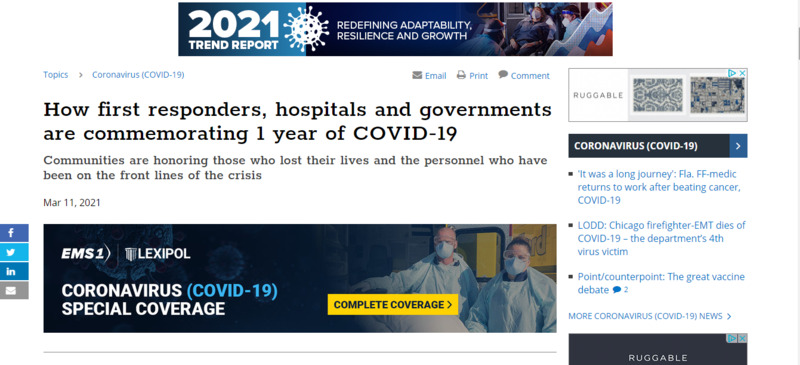 2021-03-11
2021-03-11Healthcare providers honor Covid-19's One Year Anniversary
This article is about the one-year anniversary of Covid-19 and how healthcare providers are celebrating and honoring the occasion. Healthcare workers and EMS providers have spent the past year on the front-lines of the Covid response. They have sacrificed much and have seen unprecedented horrors during this pandemic. This article features several social media posts from various healthcare agencies. In all of these posts, they acknowledge the patients and providers that we have lost in the past year, but also celebrate the efforts of the providers in trying to help the public during this pandemic. -
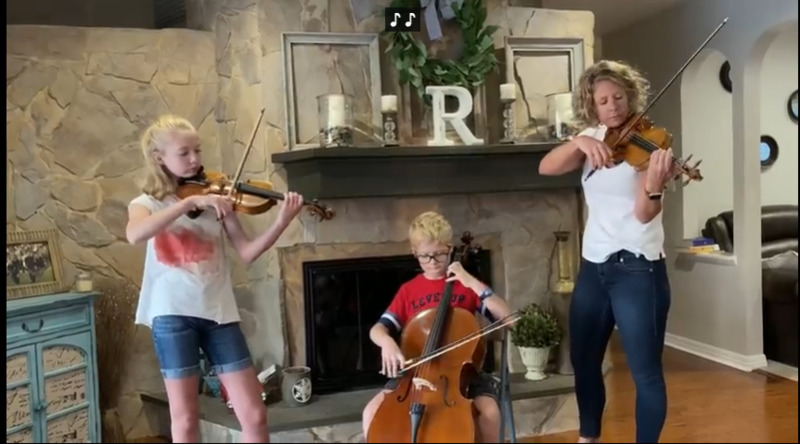 2021-04-03
2021-04-03COVID through a healthcare worker [PRIVATE Anonymous]
Working through a pandemic as a healthcare worker was terrifying. At the very beginning there were a lot of unknowns, and I felt lost, and alone. As I would go through my shifts as a CNA I had to be strong for my patients. I realized I would be going home to my family, but they were not. I was their "visitor" for the day. Patients could not just go outside for fresh air or wonder the halls to stretch their legs, they were confined to their room. Working in the hospital during this pandemic gave me a different perspective. While there were really hard days, there were also really great days. One of the best days was seeing a COVID recovered patient walk for the first time in months. It was times like this that made me realize that you are not granted tomorrow, and to enjoy each day to the fullest. I am so grateful for all the nurses, doctors, environmental services, secretaries, physical therapists, occupational therapists, case managers, and social workers who all came together to help our patients get through a challenging time. The song "Better Days" gives people hope that change and "better days" are near. The music video shows clips of people from all over the world and the impact this pandemic has on them. -
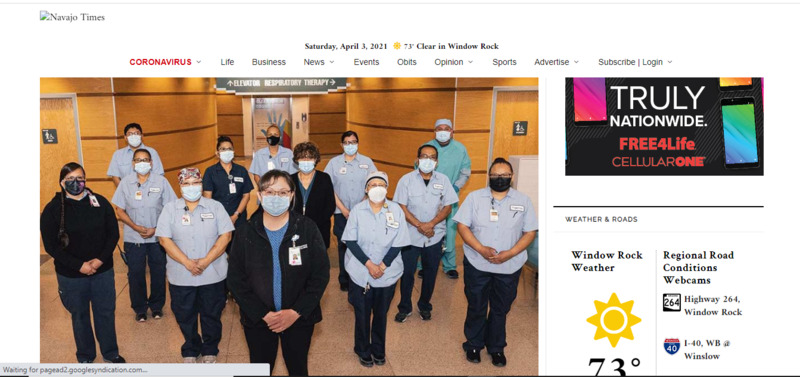 2021-03-26
2021-03-26‘They became warriors’: Reflections from the front lines as Tséhootsooí Medical Center workers share experiences
By Rima Krisst | Mar 26, 2021 | CORONAVIRUS, People | Tséhootsooí Medical Center workers share experiences Wilberta “Billy” Jackson, public health nurse III This pandemic has been the longest roller coaster of stress, grief, and loss. I’ve kept my routine simple – sleep, eat, and exercise. And, more sleep. This has been and will probably be the most challenging time of our lives. I could focus on all the bad, but so much good has come from this, from community members stepping up, leaders rolling their sleeves up and getting dirty, how we came together to care for our elders, and so much more. Professionally, we’ve adjusted and readjusted a million times over and completely changed how we deliver health care. We’ve had information, guidance, and policies being added or changing every day and we still were able to deliver health care in a safe, efficient manner. At the beginning of the pandemic, our leaders were warning everyone about the health care system being overwhelmed. Most people thought about it in terms of hospitals running out of beds, but they didn’t think of it in terms of how an underfunded and shorthanded public health force would respond to a pandemic in a rural area with limited resources, and where a population’s most basic physiological and safety needs are not being met. When you don’t have access to clean water, food, shelter and security, you’re not able to prioritize prevention measures until your basic human needs are addressed. The resiliency of the Diné people is unrivaled. The days I’m struggling or feel like giving up, I hear my grandmother’s words, and that’s what keeps me going. And my mother’s surprise delivery of Navajo soul food meals. I’m a public health nurse, so it won’t come as a surprise that I’m excited about the COVID vaccines. We’ve already seen a substantial decline in cases, hospitalizations, and deaths, so we know it’s working. My hope is that our response to the next pandemic or health care crisis won’t be complicated by politics, lack of national strategy, lack of preparation, and misinformation. Stacey Burnside, Primary Care registered nurse What I have learned from this pandemic is to cherish every day and every person that you love. COVID-19 has impacted my family and me profoundly. I lost an uncle and an aunt to COVID-19, and to this day, it is surreal that they are gone. As a primary care nurse, it is difficult to hear about losing a patient to COVID-19, and at the peak, it was almost a daily occurrence… The challenges that I faced during this pandemic were adapting to the changes in work roles and being separated from the people I love. The clinic that I worked in was closed when the pandemic hit the first peak, and I, along with my coworkers, was informed that we had to work in the Emergency Room. The moment that I saw a patient who needed me to be their nurse, despite having COVID-19, humbled me. That moment in the ER humanized COVID-19 for me and made me realize that I was put there for a reason. No matter what the situation is, nurses adapt, and the teamwork and strength we draw upon each other are phenomenal. A huge hit to me personally and professionally was losing a friend to suicide … dealing with grief, loss, and stress has been a daily thing. What has helped me is drawing strength from my God, husband and son, and family. There are many negatives to the pandemic, but one positive that many have seen is the love and strength we have found among our families. I am thrilled that we are at a point of a high vaccination rate in the Navajo Nation. I remember when I administered my first COVID-19 vaccine to a patient, it brought tears to my eyes, and I cried after work. Leah Chattin, respiratory therapist I’ve been a respiratory therapist since 2003. What I experienced throughout the first surge of COVID-19 here on Dinetah is not what you prepare for. I see the impact on my life as deep internal scars that I buried and to resurface those experiences is a nightmare. Imagine the inability to fully take a deep breath, something so simple we take for granted. Supporting my patients with breathing treatments, providing chest physical therapy, changing breathing devices constantly because the demand for oxygen escalates all in a 12-hour or more shift. All these specialized techniques to avoid the last option of intubation, allowing an artificial airway introduced to your trachea with an opening at the tip to provide mechanical breaths from a mechanical ventilator. Fear expressed from my patients was a frequent emotion. You are alone, isolated from your family, your loved ones, no familiar face to embrace, to celebrate your improvement or the worst, a decline despite the battle you have endured. I’d remind my patients not to give up… Instinct took over because I’m a mother too, a nurturer. I can remember softly stroking their hair, holding their hands, shedding tears, praying, putting myself in that empty place at bedside where your family should be gathered, processing the grief. Accepting loss was tremendously difficult. I lost myself because I did not decompress my emotions. My spirit slivered away slowly each time my patients faced rejection of our efforts to sustain life. How I endured and sustained my sanity was prayer requests. Prayer was undoubtedly my saving grace. This virus is fluidic, the path it took was unpredictable. I strongly believe we need to continue wearing a mask, following the CDC guidelines and begin or sustain our health and wellness. Putting into words my experience was not an easy effort, however it’s a pathway for healing. Every COVID patient I battled for will forever have a place in my heart. Sandra Fouser, nurse executive of the Primary Care and Specialty Clinics Seeing the virus cross the ocean and hit the heart of the Navajo Reservation forever changed our lives. As a health professional, I knew venturing into the unknown with limited protection meant some would survive and some wouldn’t. What I have learned working on the front lines – compassion, cohesiveness, companionship, strength, sadness and mental stress. We have been battered, beaten, praised, comforted and have also received recognition from all walks of life. I am proud to be a nurse. I believe the strength to endure comes from resiliency and the people we work with and the support of our families at home. As nurses, we cannot stand still. I feel it is in our blood to help and move forward. I have lost friends, coworkers, relatives and patients. The grief I feel is palpable, almost more than I can handle. Seeing my family, staff and patients suffer through illness and grief has been very challenging and heartbreaking. As a team, I believe when something happens to one of us, we all feel the effects, we grow closer and find comfort in each other. I see the vaccine as a progression toward eradicating the detrimental effects of this virus and giving us hope that there is a better tomorrow and that Hózhó will be restored. Dr. Karen Williams, hospitalist physician I am a Native physician (Mountain Maidu/Apache) and Indian Health Service Professional Scholar. When the pandemic started our hospitals were suddenly overwhelmed with large numbers of very ill patients needing oxygen. Some patients who worsened were placed on a “life support” or ventilators since they could no longer breathe on their own. Despite our best medical management efforts, including use of high-flow oxygen, there were patients who did not survive. I witnessed more death in a year than I have ever experienced in my career. This was traumatic for me because every day I came to work I felt like I was coming into a war zone. We saw people struggling to breathe and fighting for their life. We heard family members saying their goodbyes to their loved ones and crying over the phone. We held hands of those who took their last breath and witnessed co-workers not able to control their tears. If it were not for our team efforts, almost a military-style mentality, we could not have managed. As a hospitalist physician, the biggest challenge was ensuring that I had the most up-to-date medical knowledge to save a patient’s life. During the beginning of the pandemic many doctors throughout the country did not feel prepared. This was quickly overcome by learning medical strategies used by doctors throughout the world. The treatments used included steroids, anticoagulant medications, and high-flow oxygen. We had the support of our hospital’s incident command leadership and adapted to the changes. This included being able to offer our patients who needed oxygen a federal Drug Administration-approved “emergency use” medication called Remdesivir, and more recently Bamlavinimab for non-hospitalized patients My experiences on the front lines were psychologically and physically overwhelming … I sought support from elders and used my Native spirituality for strength. I also sought protection support from traditional Indian practitioners who set up a tipi and hogan outside the hospital for employees. I sometimes thought twice about the danger I was in. However, I acknowledged that I would never walk away. This is a result of my obligation to the Native community and the hundreds of patients I had gotten to know for so long. I “warriored up” in my mind and sought to do the best I could. I do not foresee an end to mask wearing, and now recognize how careful we all must be to protect each other. I saw too many elders get severely ill and even pass away from COVID as a result of young family members not being careful and bringing it home. I have encouraged community members and my own family to get the vaccine as soon as possible. I received two doses of the Pfizer vaccine and said a prayer in my Native way each time for protection. Natasha Topaha, certified medical assistant, Mobile Unit Overall, this year has been extremely challenging, but also has reinforced my personal strength and resiliency. I have had ongoing concerns throughout the epidemic regarding my kids’ isolation and their mental health. It has been difficult, but doable, to manage both working in health care and supporting my family both emotionally and physically. I had constant worry about bringing the virus home and infecting my family given that I was working in high risk areas and providing COVID testing, vaccines and social and mental health support to patients. I found that doing outdoor activities with my family, such as bike riding and hiking, helped me ease my stress and helped teach my children some healthy coping skills. And we could spend time together! I feel very happy and grateful in both receiving the vaccine and being able to provide it to patients and the community. I feel safer at work and at home now. Johnny Willeto Jr., facility manager/logistics chief The strength to endure comes from within yourself. For me this began in my childhood as the son of Delphine Damon Willeto and Johnny Willeto Sr., who nurtured me to become a great human being. They taught me to be a courageous, productive worker and know my limitations. As a facilities manager, my main focus and responsibilities are the protection in the physical environment of all who walk through the doors of Fort Defiance Indian Health Board’s facilities. All we knew is that COVID-19 was airborne and surface communicated. I treated it as you would tuberculosis and ensured that my staff had adequate PPE to help protect them when they are tasked with working in the patient care areas. This responsibility was a big challenge when trying to procure medical equipment such as masks, gloves, safety glasses, gowns, scrubs, and so forth. Having an MBA has allowed me to flourish in this high stress environment and to adjust with adaptations to finding supplies and creating new relationships with trustworthy suppliers. Being in close proximity to patients who are struggling with getting well can be heart wrenching. Being able to fulfill my duties in the support role to the best of my ability for my community and teammates has allowed me to sleep well at night knowing that I gave it my all. I have lost a brother-in-law who contracted the virus in the Scottsdale area of Arizona. These were very difficult times because as Navajos we are accustomed to comforting each other by a hug or handshake. With COVID, gatherings are not safe, so having family meetings for planning the funeral is off and also the funeral usually consists of 10 minutes before the burial with only a few close family in attendance. One of the biggest assets I have gained is the spiritual belief in God and keeping the communication open by saying my prayers often – to be thankful for the blessings that have come my way or when asking for strength to endure the hardships. In my free time I isolate on the Willeto Sheep Ranch in Goatsprings Valley, Arizona, where I tend 120 sheep and goats. Being able to separate the everyday stress and recharge is paramount to going forward with courage and mental sharpness to make the right choices for the organization, patients and employees. The vaccines are an effective tool to help reduce the mortality of the virus on us and give us protection to this invisible enemy. Corinne Legah, Environmental Service supervisor Personally, I was scared when I first heard of the spread of the virus overseas. It was shocking how fast the virus traveled. In the beginning our team was needed to help keep the hospital sanitized and safe for patients. We reinforced training on the cleaning process for the airborne/droplet virus. I constantly stressed wearing PPE and hand washing. I am so proud of the team for stepping up by protecting our patients. They became warriors to fight the virus. I believe without my husband’s support and God I would not have been able to cope. I have lost friends and family from this virus. It saddens me that many of our people are now in the spirit world. Being a Native and growing up with Navajo beliefs, I had to be strong. My ancestors went through so much and our people are resilient. Prayer is our strength. I cried when I watched the news when the vaccine was given to the first person in the U.S. If everyone gets their vaccine we will be able to interact with family again. I am looking forward to that day! -
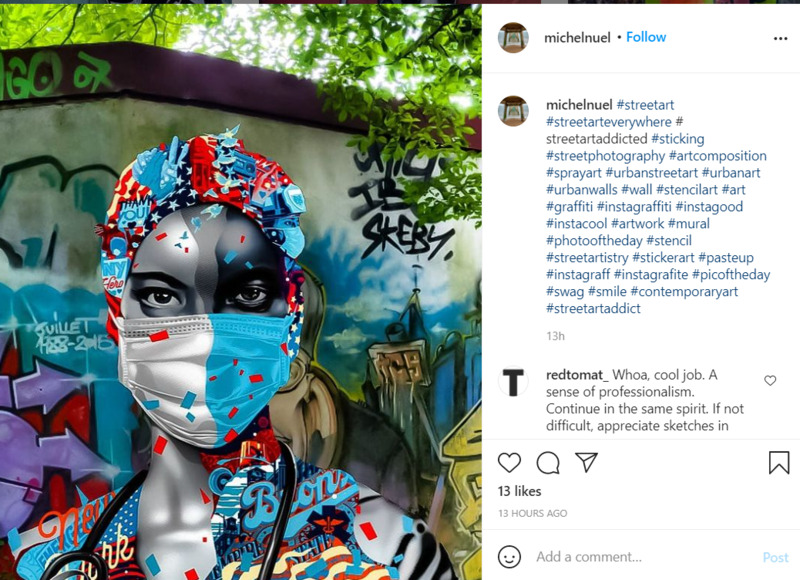 2021-03-25
2021-03-25Painting of a Nurse
#streetart #streetarteverywhere # streetartaddicted #sticking #streetphotography #artcomposition #sprayart #urbanstreetart #urbanart #urbanwalls #wall #stencilart #art #graffiti #instagraffiti #instagood #instacool #artwork #mural #photooftheday #stencil #streetartistry #stickerart #pasteup #instagraff #instagrafite #picoftheday #swag #smile #contemporaryart #streetartaddict -
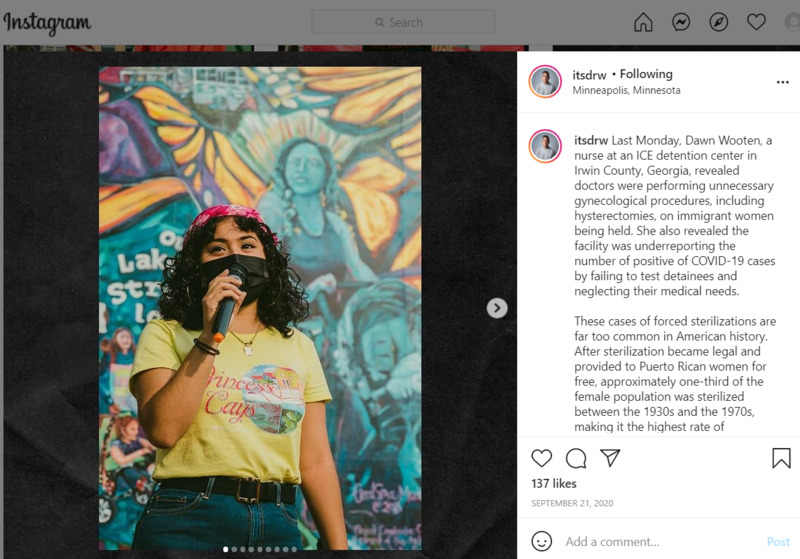 2020-09-21
2020-09-21Protests against ICE, Forced Sterilization and Under Reporting of Covid-19 Cases in Detention Centers
Last Monday, Dawn Wooten, a nurse at an ICE detention center in Irwin County, Georgia, revealed doctors were performing unnecessary gynecological procedures, including hysterectomies, on immigrant women being held. She also revealed the facility was underreporting the number of positive of COVID-19 cases by failing to test detainees and neglecting their medical needs. These cases of forced sterilizations are far too common in American history. After sterilization became legal and provided to Puerto Rican women for free, approximately one-third of the female population was sterilized between the 1930s and the 1970s, making it the highest rate of sterilization in the world. Health workers encouraged the procedure through door-to-door visits and employers showed favoritism towards sterilized women. I highly recommend a short documentary called La Operación available online about this US-imposed sterilization policy in Puerto Rico. -
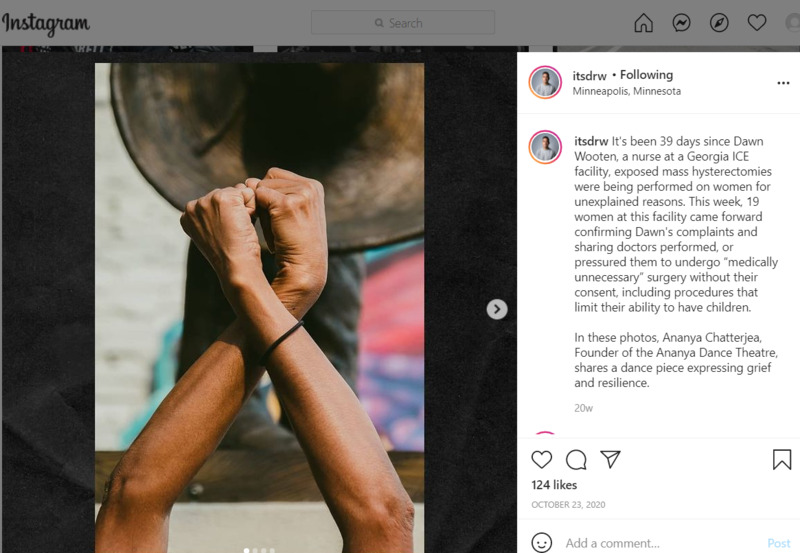 2020-10-23
2020-10-23Dance to Express Grief
It's been 39 days since Dawn Wooten, a nurse at a Georgia ICE facility, exposed mass hysterectomies were being performed on women for unexplained reasons. This week, 19 women at this facility came forward confirming Dawn's complaints and sharing doctors performed, or pressured them to undergo “medically unnecessary” surgery without their consent, including procedures that limit their ability to have children. In these photos, Ananya Chatterjea, Founder of the Ananya Dance Theatre, shares a dance piece expressing grief and resilience.
